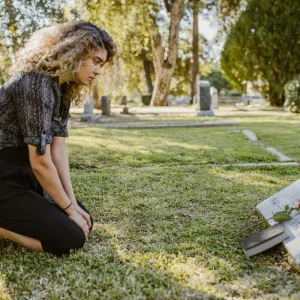Sarah began to worry when her eight-year-old daughter, Harper, started coming home later than usual after ballet lessons. When Sarah and her husband, David, decided to follow Harper to see what was causing the delay, they were shocked by what they discovered.
Sarah anxiously watched the clock, concerned that Harper’s ballet class had ended nearly an hour ago and she still wasn’t home. She tried to reassure herself that perhaps Lena’s mom, who was responsible for picking up the girls that day, had an errand to run. When Harper finally walked through the door, Sarah immediately asked why she was late. Harper’s reply was subdued; she claimed she stayed back to practice a new routine with her friends. Sarah’s unease grew, especially since Harper had been late every day that week. When Sarah questioned her further, Harper avoided eye contact and quickly changed the subject.
The following day, Harper came home late again, further fueling Sarah’s concerns. When David noticed her distress, Sarah confided in him that she had called the ballet studio, only to learn that the younger students, including Harper, were never kept late. This revelation alarmed David, and they decided to discreetly follow Harper the next day to uncover where she was going.
The next afternoon, Sarah and David parked near the ballet studio and waited. As Harper emerged, she didn’t head towards Lena’s car or take the bus. Instead, she walked in the opposite direction, leading her parents down a deserted road to an abandoned factory. They watched in horror as Harper entered the building, fearing for her safety. Inside the factory, they overheard Harper telling someone named Angela that her parents had no idea she was there.
When they finally entered the factory, they were startled to find Harper kneeling beside a frail, elderly woman who clearly needed help. Harper had brought her lunch, and the woman gratefully accepted it, praising Harper’s kindness. However, Sarah’s initial pride in her daughter quickly turned to shock when she recognized the woman as Angela, the same person who had stolen money from her mother years ago, leaving her mother penniless and unable to afford the medication she needed.
Overwhelmed by emotions, Sarah ordered Harper to leave immediately. Harper was confused and upset, not understanding why her parents were so angry. When Sarah explained who Angela was and what she had done, Harper’s compassion for the elderly woman was still evident. Angela tearfully confessed that she had stolen from Sarah’s mother out of desperation to pay for her own daughter’s surgery, but it had been too late—her daughter had passed away, leaving Angela destitute.
Despite her anger, Sarah hesitated when David encouraged her to listen to Angela’s story. Angela admitted her wrongdoings, expressing deep remorse. Although Sarah was still conflicted, Harper pleaded with her mother to help Angela. Eventually, Sarah decided to take Angela to a women’s shelter where she could receive the care she needed. This act of compassion, inspired by Harper’s innocent kindness, allowed Angela to rebuild her life.
From that day on, Sarah and Harper visited Angela regularly, and eventually, Angela found work as a lunch lady at Harper’s school. Sarah’s decision to help Angela not only gave the older woman a second chance but also reinforced Harper’s belief in kindness and forgiveness. Sarah realized that her daughter’s compassion would shape her into a person who sees the world as a place where good deeds can have a lasting impact.
Reflecting on the experience, Sarah knew that helping Angela was the right decision, one that taught Harper an important lesson about empathy and second chances.





